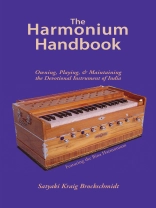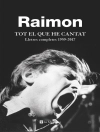The Harmonium Handbook provides detailed instruction in how to play, maintain, and repair this popular devotional instrument. It also reveals the colorful history of free-reed instruments such as the harmonium, which dates back to the time of Marco Polo. The story behind the modern version of the harmonium is a fascinating testimony to the love, skill, innovation, and intermingling of many of the world’s great cultures.
The Harmonium Handbook Reveals:
- The history of the Indian harmonium, from Ancient China to Europe and America.
- The essentials of owning and caring for Indian harmoniums, helping them give many years of service.
- How to play the harmonium in a variety of styles, from the simple to the complex, including single-note melody, melody with a drone, chords, and other more advanced methods (a complete appendix of chords and chord inversions is provided).
- How to explore the “inner realms” of the instrument and perform a variety of adjustments and corrections, including how to tune a harmonium’s individual brass reeds.
Satyaki Kraig Brockschmidt is a Microsoft design engineer. He offers precision, inspiration, and an occasional dose of wit in sharing both his musical and technical experience with this special instrument.
Tabela de Conteúdo
Contents from The Harmonium Handbook
One—A Short History of the Indian Harmonium 9
Ancient Asian Origins • European and American Reed Organs • (Re)Invention of the Indian Harmonium • Coming Full Circle • For Further Study
Two—To Know and Love Your Harmonium:A User’s Guide 23
Keyboard • Bellows • One Bellows or Two? • Stops and Drones • Which Knob Does What? • Coupler • Opening and Closing a Collapsible Harmonium • Dusting and Cleaning • Environmental Considerations • Long-Term Storage
Three—Playing the Indian Harmonium 45
Sitting at the Harmonium • Pumping the Bellows • “Breathing”: Producing a Steady Tone • Volume, Expression, and the Art of Pumping • Repeat After Me: It’s Not a Piano • Playing Styles: Introduction • Single-Note Melody • Melody with Drone • Chords • Melody with Chord-Appropriate Drones • Melody with Semi-Chorded Drones and Rhythm Accidentals • Sources of Chant Music
Four—The Inner Realms 73
External Areas • Keyboard and Key Mechanisms • Reed Chamber • A Little Inside Tour • Removing and Cleaning Reeds • Lower Bellows Chamber
Five—Adjustments, Corrections, and Tuning 95
Buzzing or Rattling Noises • Rumbling Noises • Squeaking Noises • Ticking Noises • Leaky Keys • Sticky Keys • Loose or Wobbly Keys • Wheezing • Slow, Fast, or Non-Sounding Notes • Out-of-Tune Notes • Tuning a Harmonium
Appendix A—Air Stops, Drones, and Tremolo Knobs for Select Bina Harmoniums 125
Appendix B—Chords and Chord Inversions 129
Appendix C—Tuning Sheets 147
Index 151
Photo Credits 157
About the Author 159
Sobre o autor
Kraig Brockschmidt, a former Microsoft engineer who also goes by the spiritual name Satyaki, * first fell in love with Indian harmoniums in 1996. He discovered, immediately upon sitting with one for the first time, that he already intuitively knew many subtleties of playing the instrument. Since then, devotional chanting has been one of his favorite pastimes, and he is considered highly skilled in the art.After a pilgrimage to India in 1998, during which he had the opportunity to visit the Bina factory in Delhi, he began importing Indian harmoniums on a regular basis. But after being flown halfway around the world, most harmoniums arrive in his home town of Seattle in less than perfect condition. This has given him abundant opportunities to explore the fine details of the instrument and to find solutions, as befits his engineering background, to a wide variety of technical problems.In The Harmonium Handbook, he is pleased to offer in written form the love of his heart and the depth of his experience as both musician and technician.(*“Satyaki” is a Sanskrit name meaning “devotion to truth” (satya=truth, pure consciousness; ki=a suffix meaning “devotion to”). It’s also the name of a character in the Indian epic, The Mahabharata, who symbolizes devotion.)












